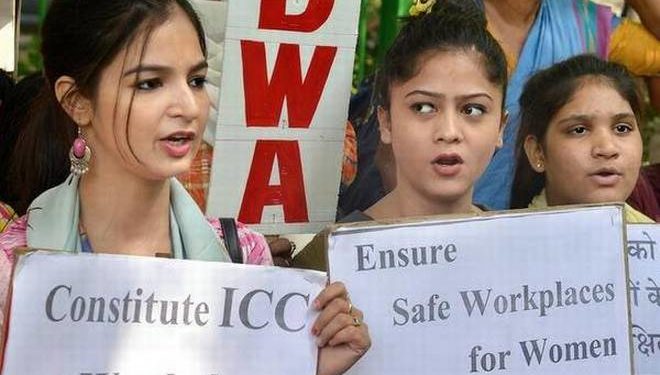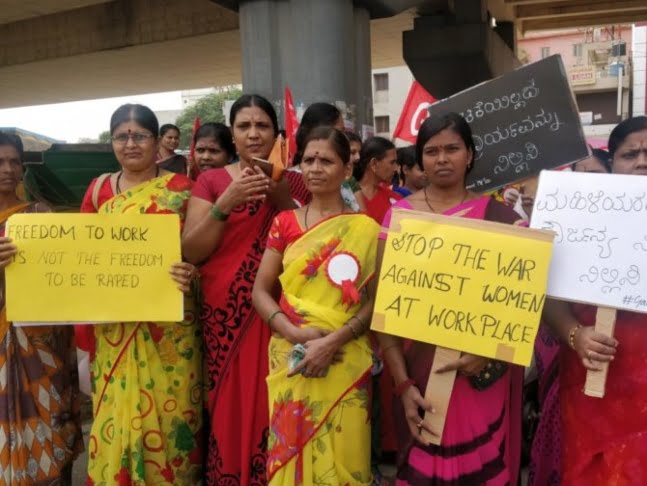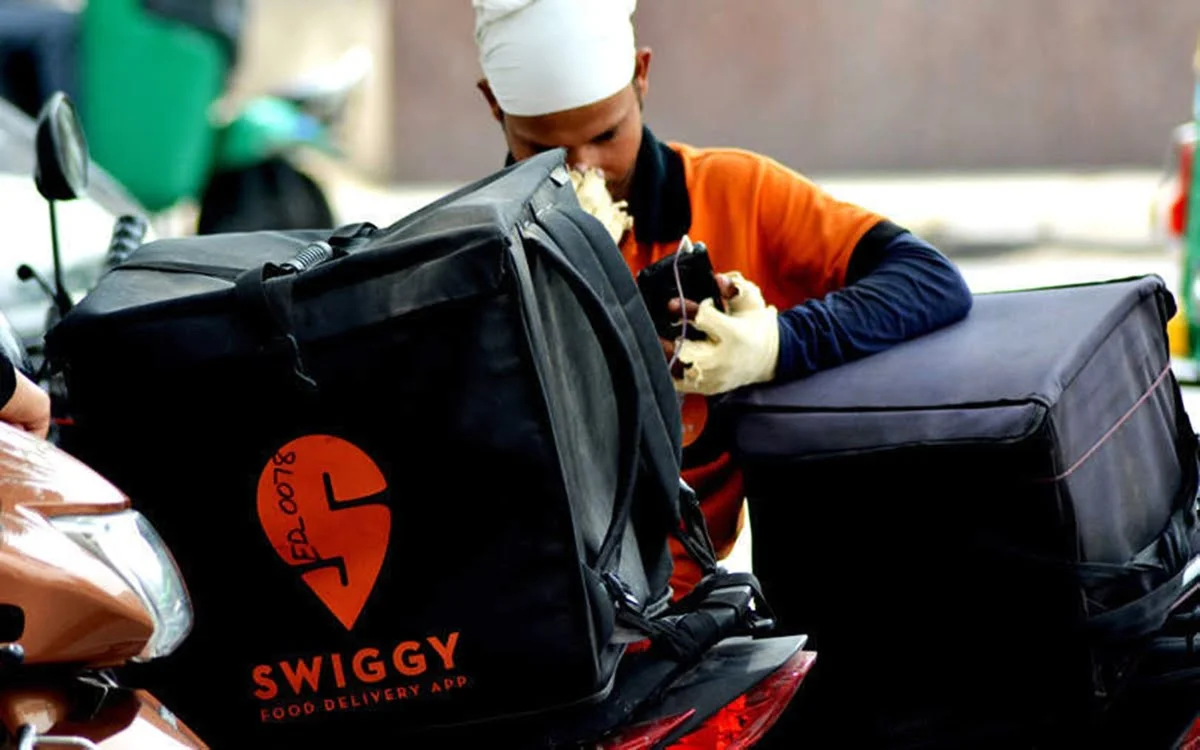Editor’s Note: FII’s #MoodOfTheMonth for May, 2022 is Gender at Workplaces. We invite submissions on the many layers of this theme throughout the month. If you’d like to contribute, kindly refer to our submission guidelines and email your articles to sukanya@feminisminindia.com
Trigger warning: Rape, workplace harassment, caste-based violence
In April this year, it was reported that global retail giant H&M, had entered into a landmark agreement with the Tamil Nadu Textile and Common Labour Union (TTCU) and the Global Labor Justice- International Labour Rights Forum to end sexual harassment and violence against women workers at Natchi Apparel (one of H&M’s largest garment suppliers in India).
This was in the aftermath of the rape and murder of a Dalit woman worker at Natchi Apparel in January 2021 by the supervisor. The agreement contains legally binding provisions, and focuses inter alia on anonymous reporting of sexual harassment incidents and the appointment of “shopfloor monitors” to protect women from verbal harassment and sexual intimidation.
This article reflects on the sexual violence incident which occurred at Natchi Apparel last year, and H&M’s response to it, particularly its commitment to combat workplace sexual harassment which resulted in the signing of the landmark Dindigul Agreement to Eliminate Gender-Based Violence and Harassment. The article also analyses similar industry initiatives by global companies to address workplace sexual harassment and the international legal treaties which facilitate such measures.

The rape and murder of Jeyasre Kathiravel, a shop-floor employee at Natchi Apparels
Jeyasre Kathiravel, employed at Natchi Apparels (which supplies to American and European fashion brands including H&M) was sexually harassed and murdered by her supervisor in January 2021. The ‘Justice for Jeyasre’ campaign page describes Jeyasre as an ‘Indian Dalit woman garment worker and union member organising against gender-based violence and harassment’. Jeyasre’s family claimed that she had been harassed for months at work and that even after Jeyasre reported the harassment, no action had been taken by Natchi Apparels.
Since Jeyasre’s death, as many as 25 other women workers at Natchi Apparels approached TTCU, which represents women who work at Natchi Apparels. The workers complained of a culture of rampant verbal abuse, sexual harassment and intimidation by supervisors (who were all men) at the garment factory. Natchi Apparels denied these allegations stating that it had robust grievance redressal mechanisms and claimed that it had not received any sexual harassment complaints related to Jeyasre’s case.
Almost a year later in April 2022, H&M, Eastman Exports, TTCU, AFWA and GLJ-ILRF entered into a landmark agreement namely, ‘the Dindigul Agreement to Eliminate Gender-Based Violence and Harassment’. It is estimated that the Dindigul Agreement (named after the city, ‘Dindigul’, in Tamil Nadu) will impact close to 5000 workers (mostly women) in spinning mills and garment cut and sew facilities
Probe into sexual harassment allegations, and H&M’s response
Following Jeyasre’s death, H&M announced that it was launching an independent third-party investigation into the sexual harassment allegations at Eastman Exports Global Clothing Private Limited (the garment export company which owns Natchi Apparels), and working on improving the safety of women in its factories in Tamil Nadu.
In a public statement, H&M also emphasised its zero tolerance of harassment of any kind, and the termination of business relations with a supplier where any harassment is found to have taken place. In Jeyasre’s case, H&M required that Eastman Exports compensate Jeyasre’s family, without making such compensation conditional on confidentiality or non-disclosure.
In spite of H&M’s commitments and assurance that it would properly investigate Jeyasre’s death and take relevant action, H&M faced flak from international labour rights groups for not adequately protecting other women workers even after Jeyasre’s death. The Asia Floor Wage Alliance (AFWA) and the Global Labor Justice- International Labor Rights Forum (GLJ-ILRF) also criticised H&M for not preventing the alleged intimidation of Jeyasre’s family by Eastman Exports following Jeyasre’s death. Jeyasre’s family had claimed that they were pressured by Eastman Exports to accept financial compensation and release the supplier of any liability for Jeyasre’s death.
Also read: Assessing The State Of Women In The Unorganised Sector Under POSH Act 2013

In a public statement in April 2021, the International Dalit Solidarity Network (IDSN) and the AFWA urged garment brands to ‘negotiate a binding agreement to end systemic gender-based violence that leverages caste-discrimination’. The statement attributed Jeyasre’s murder to gebder-based violence (GBV), amplified by unchecked caste-based discrimination in the workplace.
Almost a year later in April 2022, H&M, Eastman Exports, TTCU, AFWA and GLJ-ILRF entered into a landmark agreement namely, ‘the Dindigul Agreement to Eliminate Gender-Based Violence and Harassment’. It is estimated that the Dindigul Agreement (named after the city, ‘Dindigul’, in Tamil Nadu) will impact close to 5000 workers (mostly women) in spinning mills and garment cut and sew facilities.
While the text of the Dindigul Agreement is not available in the public domain, it is reported that the agreement contains provisions mandating all workers, supervisors and executives to undergo GBV training under a program developed by AFWA known as ‘Safe Circle’. Further, the TTCU would appoint and train women workers as “shopfloor monitors” to ensure that women are protected from sexual intimidation and verbal harassment.
An overhaul of Natchi Apparel’s internal committees (set up under the Sexual Harassment of Women at Workplace (Prevention, Prohibition and Redressal) Act, 2013) is also contemplated, due to the inability of the existing committees to effectively prevent and address GBV in the past. The agreement envisions the role of an independent panel to whom women employees may anonymously report sexual harassment; the said panel would be empowered to seek monetary compensation for victims and their families, as well as dismiss the perpetrators from service.
Recent industry initiatives to address sexual harassment at shop-floor level
Interestingly, GLJ and AFWA had called on H&M as early as 2018 to inter alia pilot women’s committees in factories that eliminate gender-based violence and discrimination from the supplier factories, based on their report to the International Labour Organisation (ILO) that GBV was present in H&M’s supply chains. The Dindigul Agreement is considered the second agreement of its kind in the fashion industry by leading apparel brands to tackle GBV in their supply chain.
In 2019, Worker Rights Consortium (WRC), a labour rights monitoring organisation, released a report documenting sexual harassment faced by seamstresses employed at Nien Hsing Textile factories in Lesotho, which makes garments for Levi’s, Wrangler, Lee and The Children’s Place. One of the recommendations of the WRC was that the key stakeholders (including the brands which source from Nien Hsing Textile, Lesotho trade unions representing workers at the factory, labour rights organisations and women’s rights advocates) enter into a binding, enforceable agreement to address sexual harassment faced by women workers.
Upon ratification of international treaties such as ILO Violence and Harassment Convention, states are obliged to implement the treaty provisions in their national laws. This was recognised in the landmark 1997 Supreme Court ruling in Vishakha v. State of Rajasthan which was the progenitor of the Sexual Harassment of Women at Workplace (Prevention, Prohibition and Redressal) Act, 2013 in India
In August 2019, it was reported that the apparel companies which sourced from Nien Hsing Textile had signed binding agreements to tackle GBV at the suppliers’ factories in Lesotho; the provisions of the agreement included the setting up of an independent investigative body for GBV complaints from factory workers, extensive worker-to-worker and management training and enforcement of remedies in line with the Lesotho law.
Given that women make up almost 80% of the workforce in the garment industry worldwide, industry initiatives with binding commitments such as the Dindigul Agreement and the Lesotho Agreement to tackle GBV are imperative.

Relevant provisions in international agreements
International human rights treaties (although signed between countries) are increasingly recognising the role which businesses play in addressing GBV. For instance, the ILO Violence and Harassment Convention (2019), which establishes global standards for ending violence and harassment at work, recognises that employers’ organisations can help to address the impacts of domestic violence. The Dindigul Agreement draws upon the provisions of the ILO Violence and Harassment Convention.
Similarly, the United Nations Guiding Principles on Business and Human Rights (which are in the form of guidance and not mandatory in nature) apply to all States as well as business enterprises (regardless of their size, sector, location, ownership and structure). A foundational principle set out in the UN Guiding Principles is that business enterprises are obliged to respect human rights including those set out in the ILO’s Declaration on Fundamental Principles and Rights at Work, and accordingly address any human rights violations.
Upon ratification of international treaties such as ILO Violence and Harassment Convention, states are obliged to implement the treaty provisions in their national laws. This was recognised in the landmark 1997 Supreme Court ruling in Vishakha v. State of Rajasthan which was the progenitor of the Sexual Harassment of Women at Workplace (Prevention, Prohibition and Redressal) Act, 2013 in India.
Through national laws, states in turn require organisations to safeguard human rights and put in place the appropriate grievance redressal mechanisms for any violations.. Even in the absence of such a mandate from the state, organisations should consider it their moral duty to create a safe working environment for employees and work together with the relevant stakeholders to achieve this.
Also read: ‘My Boss Kept Complimenting My WhatsApp Dp’: Addressing Subtle Forms Of Harassment
Devika is a lawyer empanelled with the Ministry of Women & Child Development as a resource person with expertise on the PoSH law. She also runs Women & Justice, a research and awareness initiative. She is on Twitter and LinkedIn
Featured Image Source: Peepingmoon
About the author(s)
Devika is the founder of'Women & Justice', a research project that analyses how the legal justice system in India interprets women's rights and its reflection on societal attitudes towards women. She is on Twitterand LinkedIn




